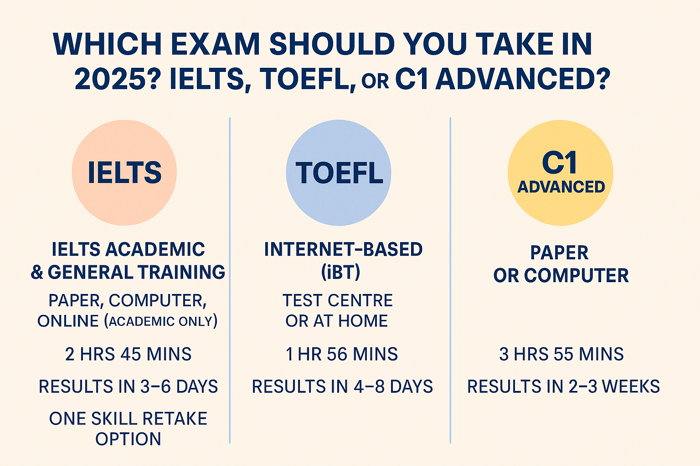If you want to study at an English-speaking university, apply for a job, or secure a visa in an English-speaking country, chances are you’ll need to prove your English level — and that usually means passing an internationally recognised English exam.
So, which exam should you take?
The three most popular options in 2025 are:
IELTS (International English Language Testing System)
TOEFL iBT (Test of English as a Foreign Language – Internet-Based Test)
C1 Advanced (formerly known as CAE, from Cambridge English)
Each test evaluates your English skills in Writing, Speaking, Reading, and Listening, and places you on the CEFR scale — from A1 (beginner) to C2 (proficient). However, the structure, focus, and suitability of these exams vary significantly.

CEFR Level: Who should take what?
If you’re reading this, your English is probably already at a decent level — good enough to be thinking about taking an exam. But it’s important to choose a test that matches your current proficiency.
IELTS and TOEFL are suitable for a wide range of levels, typically B1 to C1.
C1 Advanced (Cambridge’s exam) is specifically designed for advanced learners — B2 and above — and focuses heavily on academic and professional language. If you’re not already at an upper-intermediate level, this one might not be the best choice.
How long are the certificates valid?
IELTS and TOEFL scores are valid for two years.
C1 Advanced results technically don’t expire, and the certificate is valid for life — but many institutions still require that your results are no more than 2–3 years old for admissions or immigration purposes.
Different versions, formats, and flexibility
Each exam offers different options, and they’ve evolved a lot over the past few years — especially with the introduction of digital formats and remote testing.
IELTS
Available in Academic (for university) and General Training (for migration/work) formats.
You can now take IELTS Academic Online — a fully remote version from the comfort of your home, available in many countries. It’s accepted by hundreds of universities worldwide.
IELTS is offered as both paper-based and computer-based at test centres.
Test time is approximately 2 hours 45 minutes.
Results are typically available in 3–5 days (computer/online) or 13 days (paper).
One Skill Retake is now available in many locations — letting you re-sit just one section of the test.
Note: IELTS Online is currently available for Academic only, not General Training, and not accepted for immigration purposes.
TOEFL iBT
Entirely computer-based, with options to take it at a test centre or from home.
Takes less than 2 hours to complete.
Results are delivered in 2–4 days.
Widely accepted in the US, Canada, UK, Australia, and more.
C1 Advanced (formerly CAE)
Available in paper-based and computer-based formats, though not yet available as a remote/home exam.
Designed for C1-level learners and up.
Results take 2–3 weeks to arrive.
Especially popular in the UK and Europe for university and professional use.
Choosing the Right Exam: Ask Yourself These Questions
Do you prefer typing or writing by hand?
If you’re a fast typist, you’ll probably prefer TOEFL, computer-based IELTS, or IELTS Online.
If you like working on paper, go for paper-based IELTS or C1 Advanced.
Would you rather take the test at home?
Choose TOEFL iBT Home Edition or IELTS Academic Online — both can be taken remotely.
Note that C1 Advanced must be taken at an official test centre.
Are you shy about speaking English?
TOEFL involves speaking into a microphone.
IELTS and C1 Advanced involve live conversation with an examiner (which many students actually find more natural).
Even in IELTS Online, the speaking section is conducted via live video chat.
Do you need results quickly?
TOEFL iBT and IELTS Online/Computer-Based deliver results in under a week.
C1 Advanced results typically take longer — around 2–3 weeks.
How Each Exam Works (2025 Formats)
IELTS (2 hrs 45 mins)
Available Formats: Paper, Computer-Based, Online (Academic only).
Listening (30 mins) – 4 recordings, played once.
Reading (60 mins) – 3 texts with various tasks (Academic or General Training depending on format).
Writing (60 mins) – Two tasks: a data analysis or letter, and an essay.
Speaking (11–15 mins) – A live 3-part interview with an examiner, in person or via video call (for IELTS Online).
TOEFL iBT (1 hr 56 mins)
Available Formats: Computer-based at test centres or at home.
Reading (35 mins) – Two passages (~700 words each) with comprehension questions.
Listening (36 mins) – Two lectures and two conversations.
Speaking (16 mins) – Four recorded speaking tasks.
Writing (29 mins) – One integrated task and one opinion essay.
C1 Advanced (3 hrs 55 mins)
Available Formats: Paper-based or computer-based only.
Reading & Use of English (90 mins) – Grammar, vocabulary, and reading tasks.
Writing (90 mins) – One structured essay + one task from a selection (report, proposal, etc.).
Listening (40 mins) – 4 parts, recordings played twice.
Speaking (15 mins) – In-person exam with another candidate.
So… Which One Should You Take?
In 2025, IELTS continues to be the most flexible option, especially with the introduction of IELTS Academic Online and the One Skill Retake. It’s a great all-round choice whether you’re aiming for university, work, or migration.
TOEFL iBT is leaner and faster than ever, with reliable online delivery and strong acceptance across North America and beyond.
C1 Advanced remains the gold standard for demonstrating truly advanced English — ideal for students and professionals already operating at a high level, particularly in the UK and Europe.
Final Thoughts
The right exam is the one that suits your goals, learning style, and test-day comfort. Be sure to double-check what your university, employer, or visa authority accepts.
And remember: preparation is everything. Consistent practice, mock exams, and support from an experienced teacher can make all the difference.
Need help preparing? Book a lesson with one of our expert English Exam Teachers today — and take the next step toward your goals. 💬 English Exam Tutors
FAQs
Which exam is easier: IELTS, TOEFL, or C1 Advanced?
It depends on your strengths. IELTS and TOEFL are more flexible in terms of level, while C1 Advanced is aimed at advanced learners only. If you're comfortable with grammar-heavy reading and writing tasks, C1 Advanced may suit you. Prefer a conversational speaking section? IELTS might feel easier. Want to avoid speaking to a person? TOEFL could be your best bet.
Can I take these exams from home?
TOEFL iBT and IELTS Academic can both be taken at home in many countries. C1 Advanced must be taken in-person at a certified test centre. Always double-check with the institution or test provider for the most up-to-date options in your location.
How long are the exam results valid?
IELTS and TOEFL results are valid for 2 years. C1 Advanced results don’t technically expire, but most universities and employers will only accept certificates from the past 2–3 years.
What’s the fastest test in terms of duration and results?
TOEFL iBT is now the shortest (just under 2 hours), with results in 2–4 days. IELTS takes around 2 hrs 45 mins, and results come in 3–6 days (or 13 days for paper tests). C1 Advanced is the longest and slowest — just under 4 hours with results in 2–3 weeks.
What if I only need to improve one skill (like Speaking)?
IELTS now offers a One Skill Retake option in many locations, allowing you to re-sit just one section instead of the full test. TOEFL and C1 Advanced currently require retaking the whole exam.




